
Project of the Month: PUTSPACE
By Alison MacDermott
Posted: 11 April, 2022
HERA is pleased to present the next Project of the Month: PUTSPACE.
PUTSPACE examines public transport as one type of public space, challenging existing definitions of public space. It explores how public transport confronts citizens with social diversity, speaking of different types of ownership, surveillance, subversion, interaction and transformation of social norms.
The project aims to humanise transport research by studying diverse narratives, experiences and contestations of public transport as they have been unfolding in Europe since the eighteenth century. The project places public transport at the frontline of what is, can be, or should be public in the city.
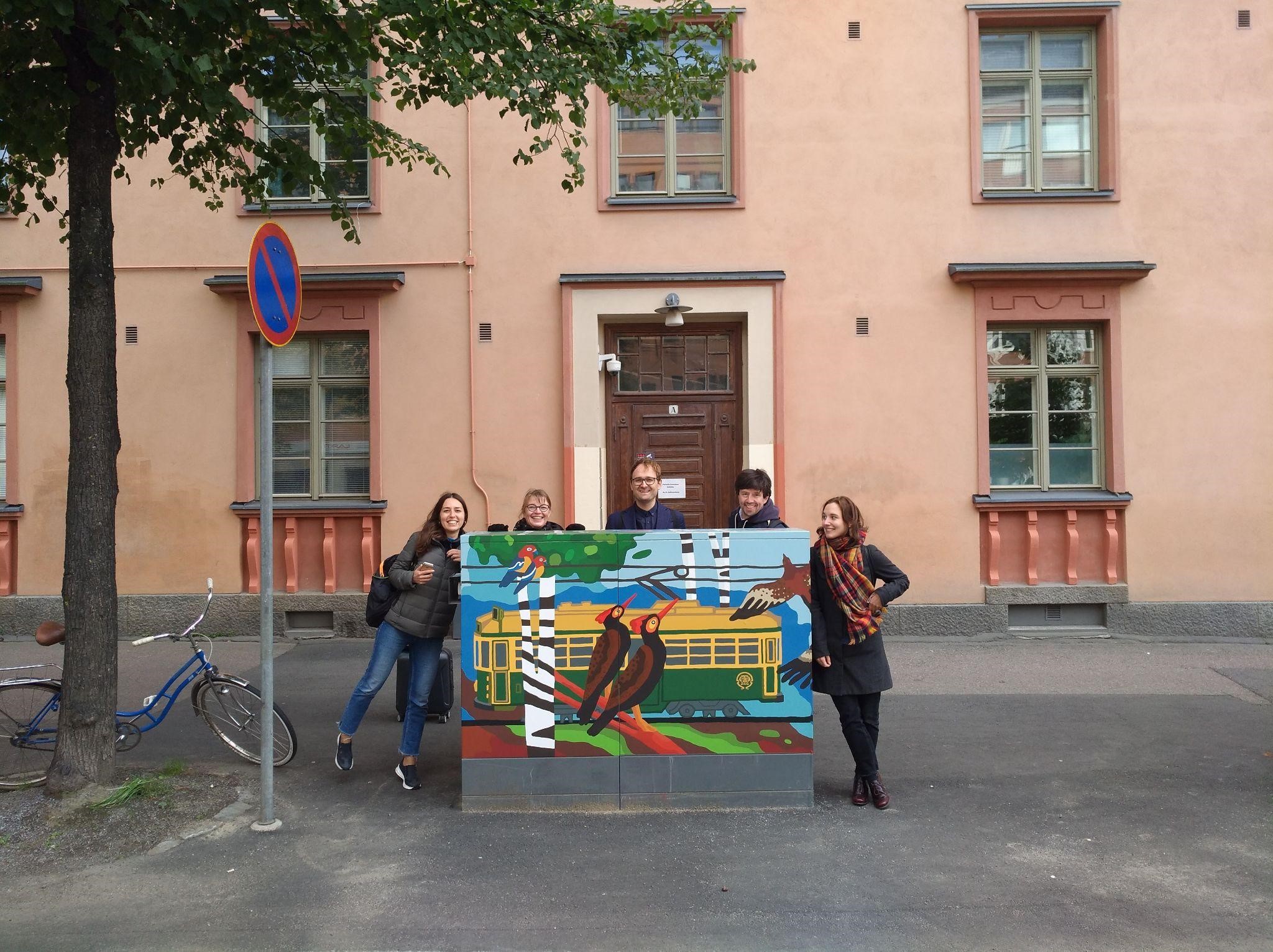
Visiting the new tram in Tampere, Finland (September 2021). In August 2021, Tampere’s new trams started running and PUTSPACE went to have a look. Beyond taking a ride, we were interested in the Tampere Tram Network’s Art Project and met with its coordinator Laura Lehtinen. During the trip, we studied many of the art works created along the tramlines, including this electricity box decorated by PUTSPACE PhD student and artist, Aleksandra Ianchenko. [Photo Credits: Zeynep Ceren Akyüz Correia]
Project Name
Public Transport as Public Space in European Cities: Narrating, Experiencing, Contesting (PUTSPACE)
Project Team
- Professor Tauri Tuvikene (Tallinn University, PL)
- Associate Professor Jason Finch (Åbo Akademi University, PI)
- Dr Wladimir Sgibnev (Leibniz Institute for Regional Geography, PI)
- Dr Frédéric Dobruszkes (Université Libre de Bruxelles, PI)
- Dr Silja Laine (Åbo Akademi University)
- Dr Tonio Weicker (Leibniz Institute for Regional Geography)
- Dr Wojciech Kębłowski (Vrije Universiteit Brussel)
- Aleksandra Ianchenko (Tallinn University and Åbo Akademi University)
- Louise Sträuli (Tallinn University and Université Libre de Bruxelles)
- Adam Borch (Åbo Akademi University)
Describe your project development to date
Public transport has specific characteristics as a complex type of public space. While in many ways like a street or a square, PT is a space that is different in its intensity (a space of close encounters with associated difficulties in disentangling from others); in the importance of trust (which you need to have towards others in confined spaces); in its unavoidability (a very diverse public space, which people not only want to use but have to use); and in its spectacularity (related to the future scenarios and city visions attached to new PT infrastructures).
PUTSPACE has investigated how to move beyond technological approaches to public transport in different ways. It has shown, firstly, the experience of public transport as affected by COVID-19, the ways in which minorities experience public transport, and not necessarily as convivial and inclusive space, and how art conceptualises atmospheres of vehicles. Nevertheless, experiences are political, and behavioural, attitudinal and atmospheric elements of experience on public transport are crucial in achieving a more socially just, inclusive and resilient urban future. Secondly, historical narratives interact with those of contemporary ones in imaginations of tram-based futures: trams are making a comeback in many places such as in London and face multiple narratives about potential historical revival in cities such as Turku. Thirdly, the publicness of public transport is shaped by various policy factors, importantly by that of price. We thus have highlighted various justice elements that relate to fare-free travel in Tallinn as well as experiences of fare evasions in Brussels. Moreover, public transport visions compete with one another constituting a contested field.
How did the pandemic impact on the project and how has the project adapted?
Like for most projects featured in this series, the pandemic had a great impact on PUTSPACE, affecting our work and plans alike. Once we had all become accustomed to online meetings (something which had to happen quickly), the fact of having to reorganize normal academic events that were initially envisioned as face-to-face gatherings online, was not problematic.
We highlight normal here, because some of the most important events in the project have not had the character of traditional academic conferences. Artistic interaction with public transport is integral to what PUTSPACE is all about and our main events were intended as platforms for artists to present and discuss their work. And, in most cases, moving the artwork to an online context came with a loss no one wanted to concede. Our insistence on the necessity of face-to-face gatherings meant our symposium in Görlitz, Germany (October 2021) moved several times, and the arrival of the omicron variant in Europe at the end of 2021 threatened to disturb our upcoming conference in Brussels, Belgium (April 2022).
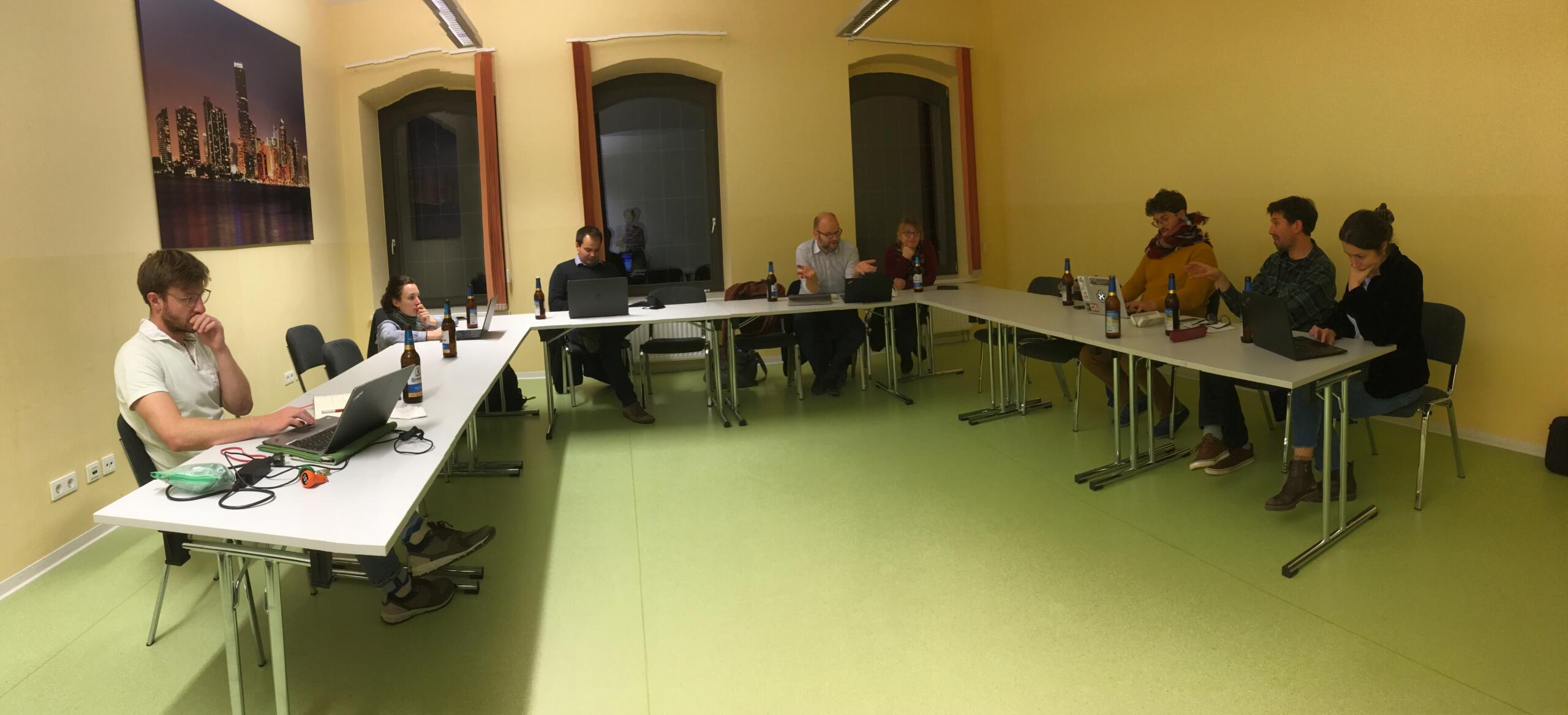
First in-person meeting of the entire project team following the outbreak of the pandemic. It was held in conjunction with the project’s symposium in Görlitz, Germany (October 2021), an event which was hit by several setbacks in the planning process (e.g. the pandemic and the political situation in Belarus where the symposium was initially meant to take place). It felt like a relief to be able to sit down face-to-face, over a beer, and discuss the state of the project. [Photo Credits: Adam Borch]
The pandemic also affected the research of several members of our team, particularly those for whom fieldwork is essential. For example, our PhD Candidate Louise Sträuli had to shift from qualitative mobile methods (such as go-alongs and in-person interviews) towards employing digital ethnography and web-based methods. Similarly, planned fieldwork in Ukraine for Tonio Weicker had to be restructured: planned interviews with activists, planners and city officials had to take place online and greater emphasis was given to the study of online platforms such as Urban Electric Transit.
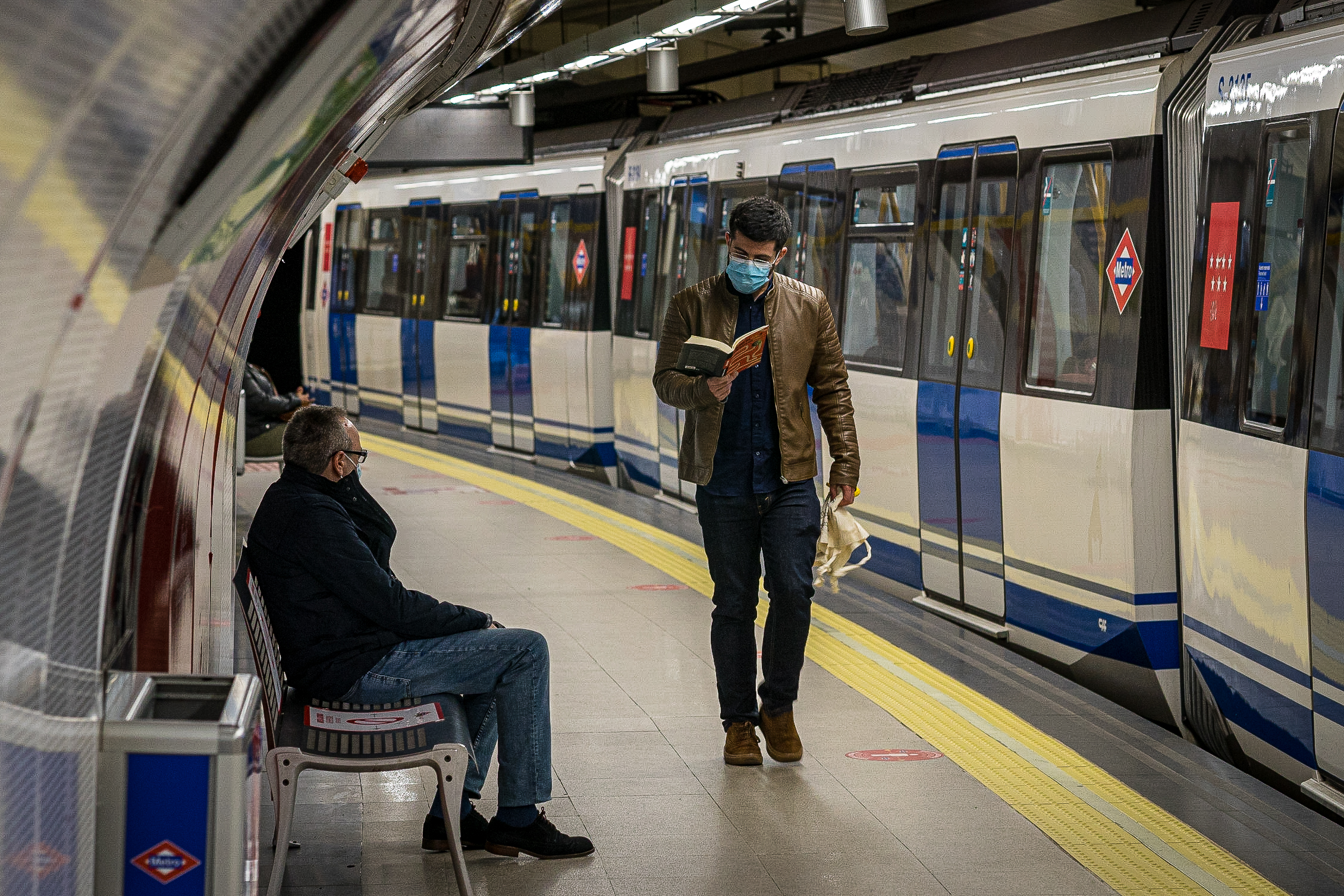
Madrid Metro during the pandemic. Plaza de España station, early afternoon, shortly after 3pm, before evening peak hours (April 2021). The pandemic still generated a lot of tensions and inequalities, with many passengers travelling in the morning facing the impossible task of achieving “physical distance”. But these early afternoon moments were eerily quiet, as stations were nearly empty. One man skipped several trains, taking a rest. Another passenger slowly walked along the platform reading a book. [Photo Credits: Wojciech Kębłowski]
In addition, the pandemic also had a concrete thematic impact on our research. Like for other public spaces, the pandemic had a significant bearing on public transport with sharply falling ridership and changing patterns of use and experience of passengers and transport workers. This we could not ignore. The pandemic took our work in a new direction and although it meant a drastic deviation from initial plans, it evolved into a very fruitful kind of collaborative exercise involving the entire PUTSPACE team.
In 2020, we decided to begin a study of how the on-going pandemic affected the experience and use of public transport as public space, considering urban transformations, intensity and contentiousness as well as policy relevance. A first online survey was conducted immediately after the outbreak of the pandemic in European cities, in late spring and early summer 2020, and another followed in late winter and early spring 2021, focusing on the “second wave” of the pandemic. Both surveys were complemented by qualitative interviews with passengers from selected project cities. We discuss the results of the first survey in a report published in December 2020. Developments, including the second survey, are detailed in a series of infographics published in December 2021.
Finally, we would just like to stress here how important our biweekly reading groups have been during the pandemic. Always planned as online gatherings, they were something that remained relatively unaffected by the pandemic; something that could just proceed as normal. As ‘normality’ broke down, they became a steady, regular place for us all to come together.
Interesting Collaborations / Partnerships
During the course of the project, we have been working with our Associated Partners in various ways. Not so long ago, we collaborated with the project SERENE at the Turku Crisis Centre in connection with their 10-year anniversary seminar (March 2022) and back in March 2021 we organised a half-day online workshop together. Under the title “All Aboard”, the workshop focused on making public transport an equal and safe space for all. A joint publication has also recently come out. We have also been working closely with the Estonian Road Museum and the London Transport Museum, especially in connection with the production of our upcoming exhibition Rabbits&Rails (see more below).
The possibility for new collaborative efforts has also emerged. For instance, with the project “EQUIMOB: Inclusive Cities through Equitable Access to Urban Mobility” which we have collaborated with in different ways: meetings between the project teams, exchanges of research interests and ideas, collaboration on a joint publication and a workshop (series) on methods for mobility research. Available at: https://inclusivemobilities.sites.uu.nl/2021/11/29/equimob-putspace-methods-workshop/
Similar collaboration has also begun with the project, “EMILIA – Entwicklung eines pandemieresistenten Öffentlichen Personennahverkehrs” focusing on investigating pandemic-resistant public transport from the perspective of design and planning of public transport vehicles.
Project Outputs
PUTSPACE has organised several events since the project’s commencement. We have held smaller symposia in Leipzig, Germany (January 2020), Turku, Finland (December 2020) and Tallinn, Estonia (March 2021) with invited guests and a larger one in Görlitz, Germany (October 2021). Later this month (April 2022), we organise the final (big) event of the project: a conference on the topic “Public Transport as Public Space” in Brussels, Belgium
We have also presented our work at numerous conferences organized by other projects and organisations over the past couple of years. For example, in 2020 and 2021, we have been present at the annual conferences of Royal Geographical Society and the Institute of British Geographers (RGS-IBG) and International Association for Transport, Traffic and Mobility
Also in 2020 and 2021, we’ve taken part in ABOAGORA, a symposium held every year in Turku, Finland. This is a major event for the city annually, and with its aim of building bridges between the arts, humanities and sciences, it has been a good match for PUTSPACE. Silja Laine and Aleksandra Ianchenko have written a blog post about their participation in the 2020 symposium and in 2021 PUTSPACE organised a panel with the title “Sparkling Trams, Silenced Rails – A Journey through European Tramscapes” where Jason Finch, Aleksandra Ianchenko, Silja Laine and Tonio Weicker presented their work. ABOAGORA made a recording of the panel and the subsequent discussion which is available online.
- Artistic Explorations
In aiming to humanise transport research, an important part of the project has been to explore the links and connections between art and academic research. This has not only been a matter of studying artistic works that focus on the experience of using public transport. We have also created our own. For example, our fellow Giada Peterle (University of Padua) created the comic LINES. Moving with Stories of Public Transport in Turku (2021) in which she explores past and present experiences of public transport in Turku, Finland through a non-academic medium, the comic. The comic received a lot of attention in local media and it was put on sale in a local bookshop. See: https://putspace.eu/giada-peterles-lines-in-the-finnish-media/
Exploring the links between art and research has also been important in the work of PUTSPACE PhD Student and artist, Aleksandra Ianchenko. As part of her research, for example, she has done performative walks along the infrastructure of the unbuilt tramline on the Laagna Road in Tallinn, Estonia. She has also created a video of these walks and in the recording of our session at the 2021 ABOAGORA symposium above, you can view the video and hear her tell about it. Another similar project is her “Tram Chalk Walk” performed in Turku, Finland (August 2021)
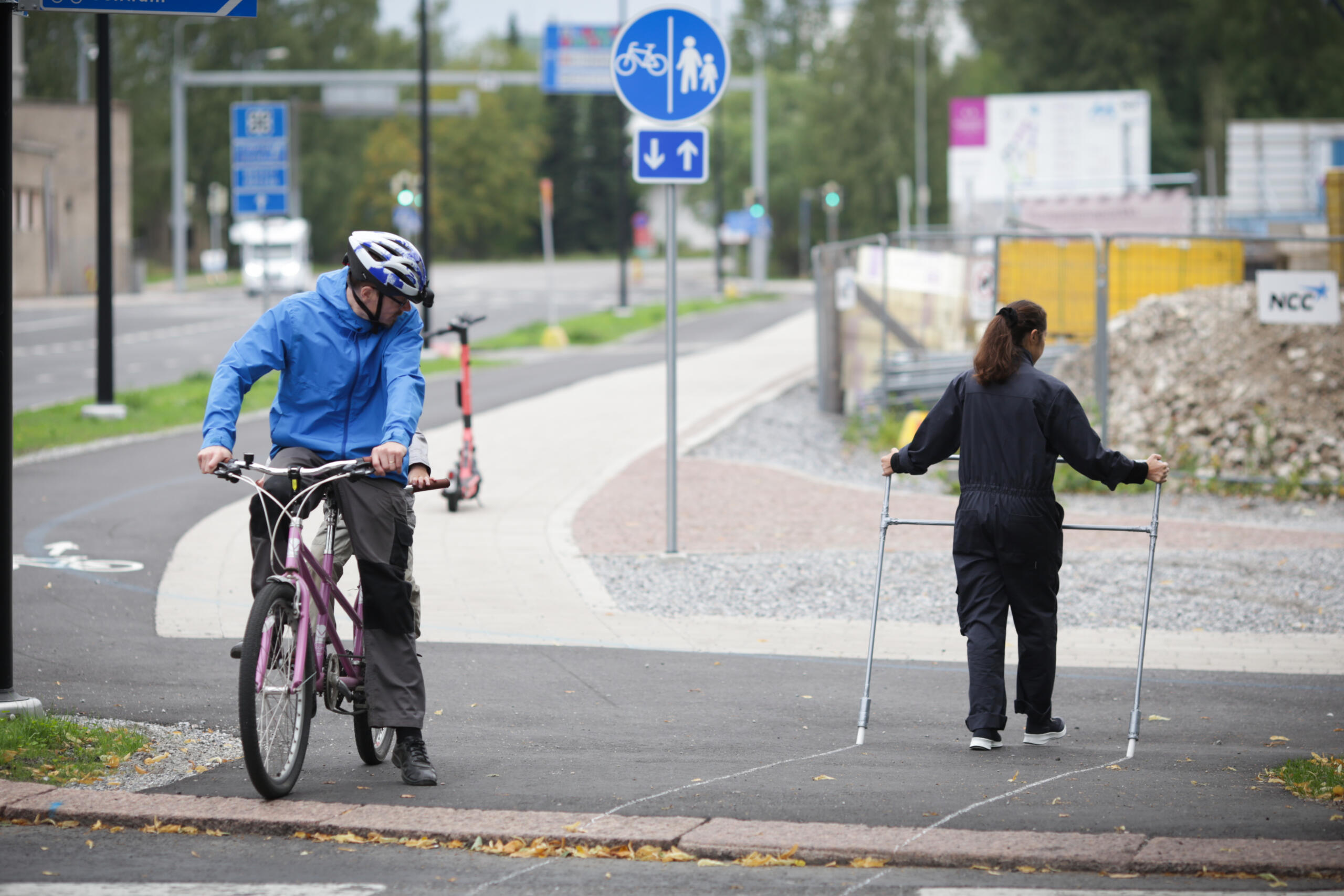
PUTSPACE PhD student and artist Aleksandra Ianchenko performs her project “Tram Chalk Walk” in Turku, Finland (August 2021). Turku’s trams closed in October 1972 and through this project Aleksandra drew attention to the city’s past public transport network. Using a specially designed frame which allowed her to mark the exact track gauge of the Turku tram (1,000mm), she followed the route of the city’s old tram line no. 1 from the harbour through the city centre to the northern district Pohjola (c.6.5km in total). [Photo Credits: Lars Kastilan]
Ianchenko is also curating the exhibition Rabbits&Rails to which the entire PUTSPACE team and some its partners have contributed. This is a key output for the project. The exhibition will open on 7 April 2022 at Les Halles Saint-Géry, Brussels and be on display until 22 May 2022. From early-June to 31 August 2022, it will be possible to see the exhibition at the Estonian Road Museum. For those unable to see it in either place, an online version has been created.
- The Project Blog
Throughout the project, PUTSPACE has maintained an active blog on its website. We use it to reflect on various issues relating to the project theme and our work. We also encourage our research fellows to write a post in which they reflect on the work they have done during their fellowships. Karol Kurnicki (Lancaster University, UK), for example, has written about a workshop he organised on the theme “Public-Oriented Mobility through Digital Technology” while Maxwell Woods (Universidad Adolfo Ibáñez, Chile) has reflected on the post-2019 social explosion in Chile and its origins in public transport.
To read more blog posts by us and our fellows, visit our website.
- A Bit of Fun…
Working in PUTSPACE makes you sensitive to cultural material which in one way or another deal with the experience of using public transport. Some such material we use in our work; some we use for more recreational purposes.
As part of the project, together with fellow Anton Polsky, a board game has also been developed, a version of which can be played online.
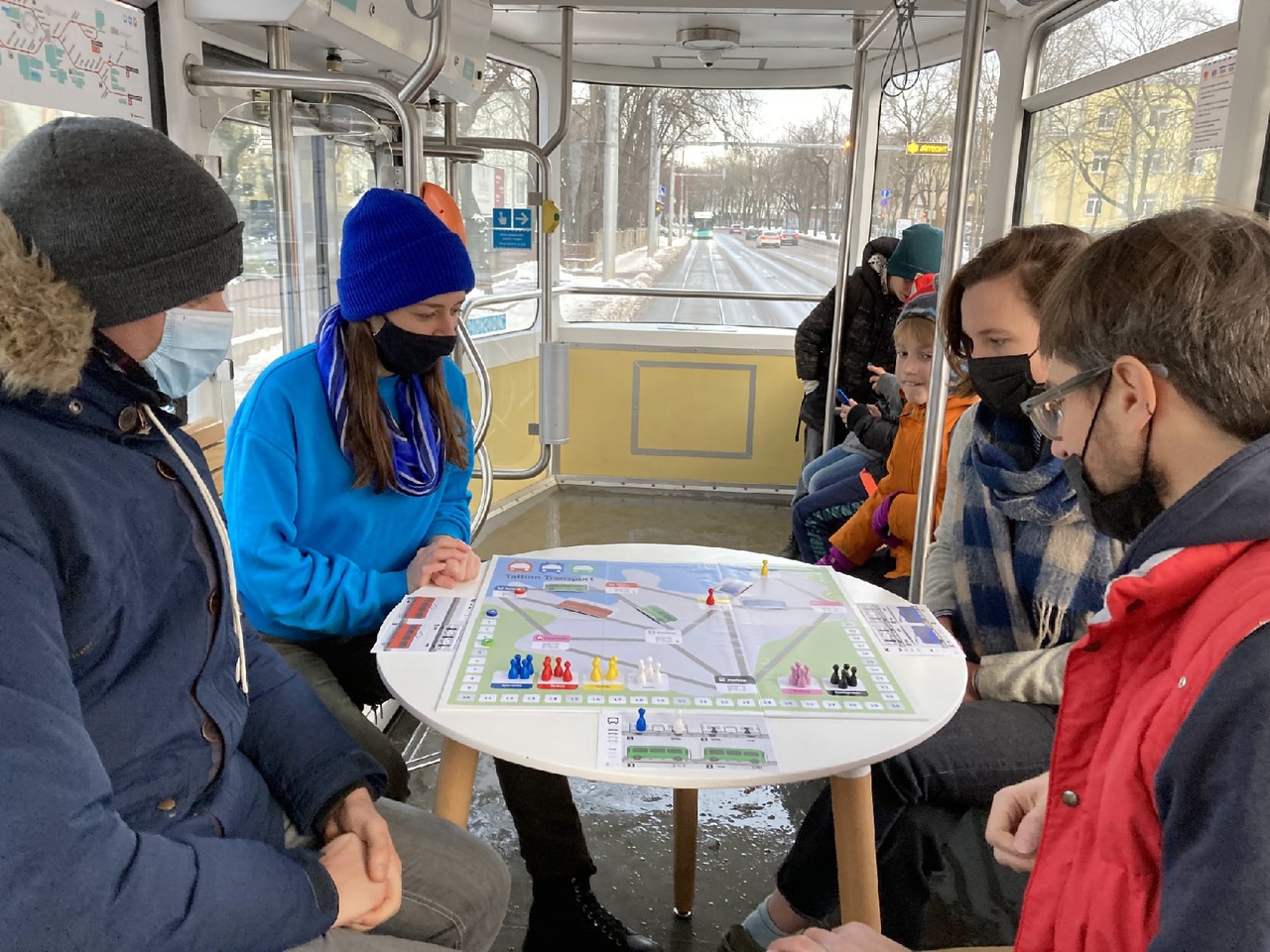
The board game “Tallinn Transport” tested on a tram in Tallinn, Estonia (December 2021). The game has been made by social artist and interdisciplinary researcher Anton Polski as part of his PUTSPACE fellowship. The game reflects the history and social aspects of the public transport system in Tallinn. However, unlike other existing public transport games, Anton’s game focuses not on building routes and delivering goods but on the social interactions amongst passengers linking them with the efficiency of transportation. [Photo Credits: Natalia Sinitsina]
Selected Publications
This short, selected list of publications exemplifies well the work done in PUTSPACE and our approach to the study of public transport. For a full list of the publications written in connection with the project, please visit our website.
- Finbom, Marcus, Wojciech Kębłowski, Wladimir Sgibnev, Louise Sträuli, Peter Timko, Tauri Tuvikene and Tonio Weicker. 2021. “Public Transport Qualities and Inequalities in Pandemic Times”. In Brian Doucet, Rianne van Melik and Pierre Filion (eds). Global Reflections on COVID-19 and Urban Inequalities. Vol 4. Bristol: Bristol University Press: 169-178. nbn-resolving.org/urn:nbn:de:0168-ssoar-71664-2
- Ianchenko, Aleksandra. 2021. “A Tram Ride You Would Talk About”. The Journal of Public Space 5 (4): 273-282. doi.org/10.32891/jps.v5i4.1403
- Kemmer, Laura, Wladimir Sgibnev, Tonio Weicker and Maxwell Woods. 2022. “Spaces of Exposure: Re-thinking ‘Publicness’ through Public Transport”. Cultural Geographies 29 (2): 285-299. doi.org/10.1177/14744740211068097
- Shaker, Reza, Annika Jungmann, Philipp Zimmermann, Lotta Häkkinen and Tauri Tuvikene. “Embodied Othering Encounters with Muslim(-Looking) Passengers: Riding across Amsterdam, Tallinn, Leipzig, and Turku”. Sociological Forum: 1-24. doi.org/10.1111/socf.12804
- Tuvikene, Tauri, Wojciech Kębłowski, Tonio Weicker, Jason Finch, Wladimir Sgibnev, Louise Sträuli, Silja Laine, Frédéric Dobruszkes and Aleksandra Ianchenko. 2021. “Public Transport as Public Space in European Cities”. Forum IfL Leipzig: Leibniz-Institut für Länderkunde. doi.org/10.5281/zenodo.5215883
And more publications are on their way. For example, Jason Finch’s article “Unruly Tramscapes: Literary Mobilities and 1930s London Tramway Closure Events” will be published later this year in Transfers: Interdisciplinary Journal of Mobility Studies.
 Share on LinkedIn
Share on LinkedIn